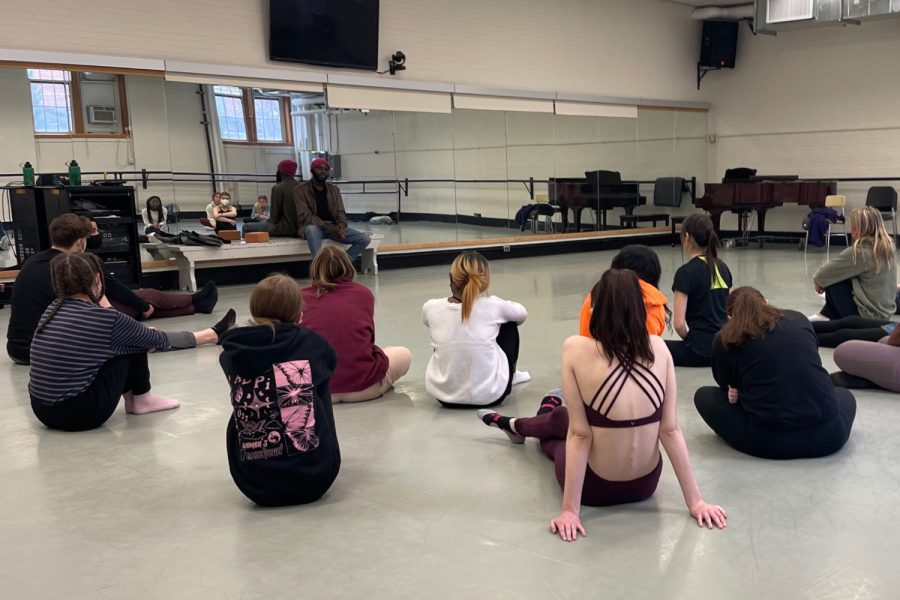Kieron Dwayne Sargeant visits UI dance department as Grant Wood Fellow
Kieron Dwayne Sargeant, originally from Trinidad and Tobago, received the 2022-23 Grant Wood Fellowship for his research on the spiritual dances from this region before and after colonialism.
Contributed photo of Kieron Dwayne Sargeant teaching teaching Intro to African Caribbean Dance Practices.
June 14, 2022
Kieron Dwayne Sargeant became interested in dancing at age 16. Until then, he played the drums for his sisters while they danced for a local performing arts company, located in the southern area of Trinidad and Tobago.
After watching his sisters perform, Sargeant realized he wanted to be both a dancer and a drummer.
“I was just fascinated by how their bodies moved in space and the stories they would tell through ritual, movement, and gestures they used that symbolized certain attributes of our culture and history,” Sargeant said.
Since then, Sargeant has received a master’s in dance performance and choreography from Florida State University, a master’s in community dance practice from Ohio University, and a bachelor’s degree in dance from the University of West Indies.
In 2020, Sargeant was awarded a place in the Helen Pickett Choreographic Essentials Program, as well as being awarded a dance fellowship from UNESCO South Africa. More recently, he was given the 2021 International Artist Award: Ayjano Folklore Heritage of Nigeria.
Sargeant researches the spiritual dances from this region before and after colonialism. He plans to introduce these dances to an international community that earned him the Grant Wood Fellowship, among other career milestones.
Related: Former UI visiting professor finds success in freelance writing
Sargeant’s research, and what he hopes to share with UI students and surrounding communities, is Trinidad and Tobago historiographies, choreographies, and ethnographies from a “Caribbeanist and Africanist perspective.” He said these perspectives open students up to other histories, and dance from a more global point of view.
“The mutual challenge that the University of Iowa offers both the students and myself is to make the global, local…to expand beyond western technical practices. To ultimately live in an ‘and’ not ‘or’ world,” Sargeant said. “It’s not ballet or African-Caribbean Dance, it is ballet and African-Caribbean dance.”
Sargeant tied in the dance department’s goal to create “dance citizens of the world at large.” He said by studying multiple disciplines of dance, one can become a more diverse dancer, as well as gain the opportunity to develop an appreciation for various cultures’ dance styles and genres.
Sargeant believes students can develop cultural and spiritual awareness, critical thinking skills, improvisation abilities, problem-solving skills, and better overall wellness through dance.
Sargeant’s research focuses on how commercial and ritual dance are not mutually exclusive, nor are they often a part of competitions.
“Rather than imagining ritual dance and commercial dance as being polarized or diametrically opposed, I seek through the use of embodied ethnographic practices to illustrate how the Limbo dance of Trinidad and Tobago can be enacted in both ritual and commercial dance stages,” Sargeant said.
Sargeant said his research allowed him to explore how capitalism and colonialism resulted in the displacement of sacred rituals for monetary gain.
“Traditional Trinidadian dance is unique, it serves the history of our country and its people,” Sargeant said. “By observing our cultural dances, one can see how pre- and post-colonialism, the migration and mobilities of various ethnic groups to Trinidad and Tobago has influenced our dance heritage and culture, making our country a cosmopolitan island.”
He uses the Limbo dance as an example of his research, saying it can function as a genealogical archive.
“This research seeks to locate itself both along the continuum of traditional African practices as they are utilized in the contemporary world by examining the Limbo dance, as practiced in Trinidad and Tobago, and as it migrated to other spaces and practices,” Sargeant said.














